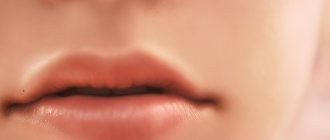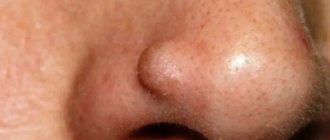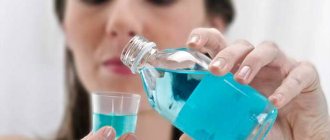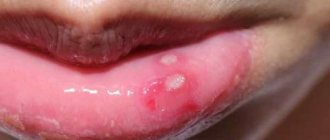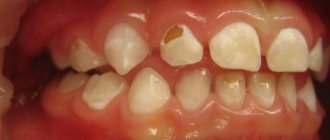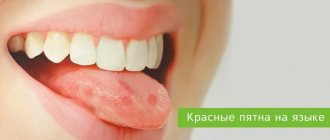Milium (horny cyst, whitehead, “millet”) is an epidermal cystic formation at the mouth of the hair follicle, looking like a small white grain. Typically, milia are localized on the face in areas with relatively thin skin, very rarely on the body, and exist for a long period without any changes. Milia are a fairly common cosmetic problem and can occur at any age. Whiteheads appear especially often during puberty; also often found in newborn babies (neonatal acne). Female representatives are more susceptible to the appearance of milia.
How is it formed
Every person from birth has a genetically determined skin color - the so-called permanent pigment.
When exposed to external and internal factors, an additional one is produced, which can be either a temporary physiological phenomenon (natural tanning) or a pathological one, difficult to remove even with special lasers (lentigo, vitiligo, etc.). The formation mechanism itself occurs in the epidermal layer. Here are located keratinocytes - epidermal cells. Their life cycle is up to 60 days, so they are constantly updated. To protect young and vulnerable cellular structures from sun exposure, melanocytes exist. They belong to the nervous system and are called upon to produce melanin, which absorbs ultraviolet radiation.
If the body is healthy, there is no overdose of solar radiation, melanocytes will produce a sufficient amount of protection. However, if there are failures, the “protectors” begin to be distributed unevenly, which leads to the formation of hyperpigmented areas.
Forms and complications of seborrheic dermatitis
There are pediatric and adult forms of seborrheic dermatitis.
Sometimes the disease is associated with psoriasis (seborrheic psoriasis).
The severity of the disease varies from mild dandruff to severe erythroderma. Dandruff affects the scalp in the hair growth area. In 70% of children, seborrheic dermatitis usually appears by 3 months of age and resolves spontaneously by 6-12 months.
In adults, seborrheic dermatitis begins in adolescence. Predominant in young and elderly people. More often affects men.
Causes of hyperpigmentation
An increase in melanin production can be associated both with physiological changes occurring in the body and as a result of pathologies. The most well-known factors influencing the occurrence of stains are:
- endocrine diseases;
- hormonal changes during pregnancy or menopause;
- diseases of the gastrointestinal tract and adrenal glands;
- metabolic disorder;
- vitamin deficiency or hypervitaminosis;
- helminthic infestations;
- severe intoxication of the body;
- trauma or inflammatory processes;
- prolonged exposure to the sun;
- taking medications - antibiotics of the tetracycline group, gentamicins, erythromycins, as well as some NSAIDs, salicylic acid, antidepressants, diuretics, sleeping pills and sedatives, antihistamines, St. John's wort extract, etc.;
- heredity.
Changes can also appear due to prolonged stress. Since melanocytes belong to the nervous system, any fluctuations and unstable conditions lead to serious pigmentation disorders.
Allergies to foods and medications
Food allergies on the face are quite common, especially in children. The most allergenic foods are peanuts, eggs, seafood, citrus fruits, and dairy products. However, in the presence of individual intolerance, an allergy can develop to any other food product.
Main symptoms:
- blotchy rash on the face or body;
- Severe itching;
- Peeling of the skin;
- Nausea, vomiting;
- Stool disorders;
- Abdominal pain.
Another important problem is drug allergies. An allergic reaction may occur to a medicine in the form of a tablet, injection, or ointment. Allergies to antibiotics, antiseptics, and nonsteroidal anti-inflammatory drugs are common. The symptoms are the same as those of a food allergy. In severe cases, complications such as angioedema or anaphylactic shock may develop2. You need to know what drugs you are allergic to and warn doctors or medical staff about it.
Localization of spots
They can have different sizes, both with clear contours and blurry ones, merge together or not grow at all. Depending on the differential diagnosis and the type of hypermelanosis, they can be located both in certain areas and without specific boundaries, covering absolutely any area of the body.
On the face
One of the most common sites of localization of many hyperpigmentations. This is due to the fact that the skin here is thin enough so that negative factors can attack them faster. Among the common phenomena are freckles, which can decorate the face all year round and also appear and disappear after exposure to the sun. They are also localized over the entire surface or located pointwise in the area of the cheeks, eyes, and forehead.
Anti-age drugs
Bb Laboratories – Delicate oil for deep cleansing
Laennec – solution for injection
Bb Laboratories – Two-phase serum concentrate
Two-phase placental serum concentrate
On the body
Namely on the arms, shoulders, chest, back, groin area. For each individual disease, there are areas where pigment accumulation is observed. For example, senile hyperpigmentation is typically located on the hands, forearms, and upper back.
Types and symptoms of age spots
Let's consider the most characteristic signs of hypermelanosis, as well as control methods that are relevant for each specific type of pathology.
Freckles
The most common type of melanin accumulation. They are mainly located on the face, in the cheek area. In advanced cases, they can completely cover the entire surface of the skin with small distances between the spots. And also have a round or oval shape, small diameter, clear contours.
Genetic predisposition plays a major role, so freckles can appear in childhood. People with red and blond hair are most susceptible to them. This is due to the need for high melanin production to protect the skin.
Freckles can be easily distinguished from other types of spots by the complete disappearance of pigmentation in cold weather, and the appearance of a whole scattering on the face with the arrival of warmth. Therefore, to combat them, creams with maximum sun filters are used throughout the year, as well as lightening cosmetics.
Melasma
Spots without clear boundaries and endings, varying in shade from bronze to dark brown. They have the ability to stretch, grow, and merge with each other into huge pigmented areas that occupy a large surface of the body. The main provoking factor is considered to be hormonal disorders caused by menopause, pregnancy, and the use of oral contraceptives. Treatments include peeling methods and procedures that promote cell renewal. When the root causes are eliminated, the stains quickly disappear.
Melasma
The second name is melanosis. It can be acquired or hereditary, manifests itself in the form of an accumulation of melanin with uneven but clear boundaries and localization in open areas of the body. May occur as a result of Addison's disease, hemochromatosis, due to sensitivity to ultraviolet radiation, anthracene or acridine substances, diseases of the pituitary gland, ovaries, adrenal glands, syphilis, tuberculosis, malaria, treatment with hormones. Pigmentation is accompanied by redness, itching, peeling, and roughening of the skin.
To prevent progress, sunscreens are used, drug therapy is prescribed with steroid groups, retinoids, hydroacids, and vitamins B (1.6) and C are additionally used.
Becker's nevus
A characteristic defect in men, it is much less common in women. The first manifestations can be as early as 10 years of age. It is a hyperpigmented area protruding above the surface of the skin, on which dark long hairs grow. It occurs both as a result of genetic factors and can appear after sun exposure, changes in hormonal levels, in particular androgens. The location most often is the upper back and chest; it is not often found on the legs, groin, or head. It has a warty surface on which acne or comedones can be seen. Does not respond well to any cosmetic procedures or medications. An argon laser is used to minimize the aesthetic defect.
Secondary
Occurs at the site of mechanical damage. They can be either deep cuts, scratches, or acne, comedones, ulcers and other superficial causes that trigger the inflammatory process in the skin cells. There is an excess of melanin, resulting in staining. They are localized where the damage was and go away after the area returns to normal and the inflammation disappears. To speed up the lightening process, you can use special lightening creams or cosmetic procedures aimed at renewing the epidermal layer.
Age
As we age, the negative effects of ultraviolet radiation lead to increased melanin production in certain areas of the body. These are usually open areas that have been exposed to a lot of sunlight during their lifetime. With age, spots appear with a diameter of 1 to 5 cm, which are darker in color than the entire surface of the skin.
Berlocc's dermatitis
Refers to contact types of immune response to irritants. Usually due to contact with perfumes, colognes, and deodorants. It is located where the skin came into contact with the substance. Symptoms may include not only a change in the color of the dermal layer, but also itching, peeling, and swelling. It disappears quickly, just stop using perfume and in a few days everything will return to normal.
Chloasma
Large spots can merge into one large skin defect. They do not have a clear contour or boundaries and can grow and increase in size throughout life. Among the provoking factors are pregnancy and lactation, menopause, changes in hormonal levels due to diseases, stress, taking oral contraceptives, steroids, the use of hormone-containing ointments and some cosmetics.
Ulcers caused by oral diseases
White sores in the mouth can appear due to diseases of the oral cavity. The most common cause is stomatitis. It comes in several types:
- aphthous;
- herpetic;
- bacterial;
- fungal.
| White ulcers in adults and children occur with aphthous and herpetic stomatitis. This disease can appear due to stress, untreated caries, lack of vitamin C, or overexertion. It is better not to self-medicate, but to immediately consult a doctor. Recommendations, in addition to medications, may include treatment of caries, a balanced diet, stress reduction, etc. |
| There are two separate forms of stomatitis - Bednar's aphthae and Setton's aphthae. The former develop only in a child due to injury to the mucous membrane or poor oral hygiene. Such rashes are also called erosions. Setton's aphthae is a more complex and painful phenomenon. It begins with the appearance of compactions, which then develop into painful ulcers. They most often form on the inside of the cheeks, in the corners of the lips and on the sides of the tongue. |
| Another cause of white sores is gingivitis. In smokers, such rashes are much more common due to the effects of nicotine on the mucous membranes. Those who have poor oral hygiene, reduced immunity and hormonal imbalances are also at risk of encountering gingivitis. If left untreated, it can progress to periodontitis: when the tissue that supports the tooth is affected. And this is a direct path to tooth loss. |
What causes pigment spots to appear on the face after sunbathing?
Most manifestations of hyperpigmentation occur after the negative effects of ultraviolet rays. Among those that immediately appear are freckles, various melasma and chloasma. There are also those that have a cumulative effect, for example, lentigo.
Also, if during the summer vacation there were inflammatory processes in open areas of the body, most likely after they heal, a change in shade can be clearly observed.
Prolonged exposure to the hot sun with the presence of existing tumors and increased pigmentation can be fraught with the degeneration of harmless spots into aggressive cancer - melanoma. Therefore, you should limit your tanning time and use special cosmetics for protection.
Age spots and peeling
Melanin accumulation occurs in the upper layers of the epidermis. In order to remove unaesthetic problems, products that stimulate the renewal of the dermis are used. The most effective peelings are: chemical, mechanical, laser. They promote the regeneration of epidermal cells, forcing keratinocytes to produce new ones as quickly as possible, which will not have a large accumulation of coloring pigment. When eliminating the root causes of hyperpigmentation, there is a chance that you will forget about various spots for a long time.
Causeless manifestations
It happens that people try to protect their skin, use special sunscreens, but hyperpigmented areas still appear. It's like it happens for no apparent reason. However, for melanocytes to malfunction, even a small but prolonged stress or temporary hormonal imbalance is enough.
It is also worth noting the cumulative negative effect of ultraviolet radiation, which can manifest itself over the years on areas of the body that received sunburn in early childhood. Therefore, only at first glance it seems that hypermelanosis arose without provoking factors. In fact, he has hidden reasons.
Liver pigment spots
Deterioration in the functionality of internal organs can also lead to the formation of aesthetic defects. The liver plays the role of a filter, retaining and processing all dangerous substances, and then removing them from the body. In cases where she fails to cope with her duties, slow but sure intoxication occurs, which is manifested not only by internal, but also by external pathologies.
Metabolic processes in tissues are disrupted, including the normal distribution of melanin; it accumulates in certain areas. Most often it appears on the face. The contours of such spots are not uniform, they do not have a clear boundary. The color can also vary from light to dark brown.
Lentigo
The phenomenon is popularly known as “senile ripples.” Appears in older people in areas of the body that have been exposed to intense ultraviolet rays throughout their lives. The pigment usually appears on the arms from the hands to the top of the shoulders, upper back, décolleté, and face. It is distinguished by its small size, different diameters and chaotic arrangement of spots.
The first manifestations can be noticed after 40 years; they noticeably age the appearance, so many people at this stage turn to cosmetologists to eliminate the defect. During menopause, hormonal changes lead to an increase in the amount of pigment. Chemical, mechanical and laser peels are used for treatment. Cosmetics and whitening creams will not cope with the problem.
Contact dermatitis
Contact dermatitis rashes are most often localized on the hands or face. An allergic reaction can be triggered by:
- Skin care products. It is important to pre-test creams, masks, lotions and other new products by applying a small amount of product to the inner surface of the forearm for 15-20 minutes.
- Decorative cosmetics. Contains a large number of coloring pigments, fragrances and preservatives. People with sensitive skin prone to dryness and irritation are more prone to allergic reactions.
- Plant pollen. When pollen from plants to which a person is allergic comes into contact with the skin, a rash, itching and other unpleasant symptoms may appear.
Red spots may appear either immediately after contact with the allergen or after some time (usually within 24-48 hours). If you find the cause of the allergy in time and stop using the inappropriate product, then no negative health consequences will be noted.
Solarium - is it harmful?
It is also a mistake to think that sun tanning is harmful, and nothing will happen in specialized salons in a few minutes. On the beach, the skin gets a lot of heat, but this happens gradually. In the booths, a loading dose of ultraviolet radiation is given in a few minutes, which is difficult to obtain outdoors even in a whole day.
People with a fair skin type, with the presence of moles and nevi, freckles, existing aesthetic defects in the form of increased melanin production, need to get rid of the habit of visiting a solarium. The consequences can be expressed both in the progression of unsightly changes in the epidermal layer, and in their degeneration into malignant neoplasms.
Diagnostics
To accurately determine the type of hypermelanosis, as well as to identify effective means of control, you need to contact a dermatologist. At the initial visit, the doctor will collect the patient's medical history to determine the most likely internal and external factors that will indicate a certain type of disorder. He will examine the skin and also prescribe a number of tests:
- AOK and OAM;
- blood biochemistry;
- Wood's lamp tests;
- scraping;
- biopsy.
If a malignant neoplasm or fungal infection is suspected, referrals will be given for the last two procedures on the list. As a result, the specialist will be able to accurately determine the type of illness and prescribe therapeutic or cosmetic procedures.
Anti-age drugs
Bb Laboratories – Hyaluron-elastin-collagen extract
Laennec – solution for injection
Curacen Essence (20 fl x 2 ml)
Two-phase placental serum concentrate
Eczema
Eczema is an inflammatory skin disease that tends to be chronic and relapsing. Often the symptoms of eczema are confused with allergic reactions, since the rashes can be similar in appearance. Eczema is characterized by the appearance of bright red spots and swelling of the skin. Grouped bubbles with transparent contents appear on a red background, after which crusts form.
The occurrence of the disease is associated with mechanical damage to the skin, microbial or fungal infection, and occupational hazards. Complex immune reactions characteristic of allergies also take part in the development of pathology.
How to fight
Among the modern and effective methods of struggle, it is worth highlighting:
- cosmetic preparations;
- laser peeling;
- phototherapy.
Depending on the variety, medications may be prescribed to address the underlying causes. However, to remove an aesthetic defect, it will be necessary to wait for the cell surface to renew itself, or to help it renew itself faster with the help of additional deep peeling and cosmetic photorejuvenation procedures.
Cosmetic preparations
Among the popular drugs that give noticeable results in the fight against hyperpigmentation are placental products with a high content of natural peptides, amino acids and hyaluronic acid, as well as vitamins, micro- and macroelements. Injection product Curacen (Curasen) and non-injection drug Curacen Essence (Curasen Essence) are the ideal choice of cosmetologists for triple action: brightening, moisturizing and eliminating wrinkles. You can also use specialized cosmetics from the Laennec Skincare brand - LNC. This line offers to transform the skin at the cellular level, eliminating and preventing hyperpigmentation.
Now you know about the main causes of pigmentation, as well as what causes the appearance of age spots on the face, and you can easily answer the question - what to do when pigments have already appeared. Dermatologists recommend not only limiting time spent on the beach and using sunscreen in summer, but also year-round use of skin protection from the negative effects of ultraviolet radiation. It is this that becomes the main catalyst, and in combination with internal disorders of the body can lead to serious changes in the epidermal layer.
Treatment of milia
Milia do not go away on their own; it is almost impossible to get rid of them with the help of cosmetics. Under no circumstances should you squeeze out milia yourself, as this will damage the hair follicle and sebaceous gland. Such self-medication often leads to the subsequent formation of a larger acne or the addition of an infection, which can cause the formation of a rough scar.
Treatment of milia is carried out by a dermatologist and consists of opening and removing the cyst capsule with its contents. The choice of removal method depends on the location, number, size and depth of the milia. For single milia, mechanical removal is carried out (using a sterile needle and curettage) with preliminary and subsequent antiseptic treatment of the skin. Small wounds left after such a procedure heal on their own without leaving a trace.
For multiple whiteheads, modern methods are used - removal of milia with a laser, radio wave method or electrocoagulation. The crusts formed at the cauterization site disappear on their own within 10-14 days. Removing more than 10 elements at one time is not recommended to avoid significant trauma to the skin and disruption of the sebaceous glands.
